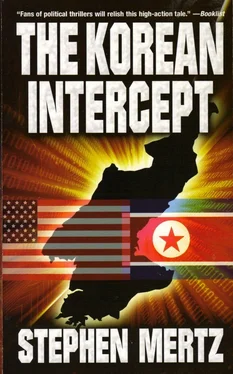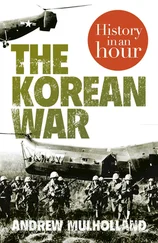Stephen Mertz - The Korean Intercept
Здесь есть возможность читать онлайн «Stephen Mertz - The Korean Intercept» весь текст электронной книги совершенно бесплатно (целиком полную версию без сокращений). В некоторых случаях можно слушать аудио, скачать через торрент в формате fb2 и присутствует краткое содержание. Жанр: Триллер, на английском языке. Описание произведения, (предисловие) а так же отзывы посетителей доступны на портале библиотеки ЛибКат.
- Название:The Korean Intercept
- Автор:
- Жанр:
- Год:неизвестен
- ISBN:нет данных
- Рейтинг книги:3 / 5. Голосов: 1
-
Избранное:Добавить в избранное
- Отзывы:
-
Ваша оценка:
- 60
- 1
- 2
- 3
- 4
- 5
The Korean Intercept: краткое содержание, описание и аннотация
Предлагаем к чтению аннотацию, описание, краткое содержание или предисловие (зависит от того, что написал сам автор книги «The Korean Intercept»). Если вы не нашли необходимую информацию о книге — напишите в комментариях, мы постараемся отыскать её.
The Korean Intercept — читать онлайн бесплатно полную книгу (весь текст) целиком
Ниже представлен текст книги, разбитый по страницам. Система сохранения места последней прочитанной страницы, позволяет с удобством читать онлайн бесплатно книгу «The Korean Intercept», без необходимости каждый раз заново искать на чём Вы остановились. Поставьте закладку, и сможете в любой момент перейти на страницу, на которой закончили чтение.
Интервал:
Закладка:
"But the others…"
"We can't help Al and Leo right now. We barely have time to help ourselves."
"All right, all right."
They made quick work of removing the semiconscious woman from her seat, moving her across the gloom of the living quarters to an exit. A ladder was lowered and, after considerable angling of her this way and that between them, Kate and Bob managed to lower Terri to the ground outside.
Breathing the cold night air in long measures completed the process of clearing Kate's senses. She became aware of her surroundings, of the shapes of trees swaying in the wind. She looked around at the silhouettes of mountains against the night sky full of stars, and shivered. Playing her flashlight past Liberty's heavily-dented fuselage and beyond, she saw the long path of smashed trees and sheared-off limbs along a ridge that had acted as a runway of sorts. The slope of the ridge-going down, not up-had helped avoid a direct head-on impact into the ground. The trees had somewhat cushioned the crash.
Scott stood, supporting himself on his good leg, against the fuselage. He held a pistol, one of the Colt.45 automatics from Liberty's extremely limited armory. The wind moaned.
Kate said, "Good work setting us down, Commander."
Scott shook his head. "Not good enough for Al and Leo. You two hop back inside. We'll need canteens, weapons and the camouflage netting. The two of you are going to have to cover this bird before we move out."
"Right." Kate started briskly toward the hatch before becoming aware of Bob's hesitation, as if he was hesitant to reboard the orbiter from which they had so narrowly escaped. "Come on, Bob," she said. "Move it. What are you waiting for?"
"Nothing," Paxton said quickly, self-consciously. "Here I come."
Kate let him board first. When she started to follow, she became aware of two things: the first dry flakes of snow, whipped by the wind, stinging her cheeks… and some sixth sense that told her she was being watched. She swung the flashlight around.
There, among the trees, the beam picked out the figure of an elderly man, a scraggly figure wearing a frayed woolen jacket, baggy trousers and straw hat, who stood silently, watching them from behind the swirling veil of snow.
Scott saw him too. "Uh oh," he whispered, raising his pistol.
Chapter Two
Camp David, Maryland
Sunshine, drenching the rolling hills, made the bark of the birch trees seem whiter, and dappled through their bare branches over a winding gravel path. Halfway into his three-mile run through the Camp David forest, the president of the United States noted with satisfaction that he was not short of breath as he crested a steep rise. He'd been a confirmed two-pack-a-day man before the last election, when his campaign advisors had convinced him that a non-smoking image would be far more appealing to voters.
The chief executive was a vigorous man. At sixty-five years of age, he looked at least a decade younger. Five-foot-ten, he weighed in at a solidly-built one-eighty. His face was naturally round, but with strong features and striking eyes that were penetrating and direct. The salt and pepper hair was worn military style, unfashionably short. The fact that he was an ex-military officer, not a professional establishment politician, had contributed largely to his being selected as his party's vice presidential candidate. He was not considered attractive or elegant but exuded a straightforward style and grace that the public and the media had taken to. Three months after being sworn in, he had become president when his predecessor succumbed to a debilitating stroke. Upon assuming the post of chief executive, he had made some prompt and drastic changes among his predecessor's staff and cabinet, appointing a close circle of advisors who were not yes-people or inside-the-beltway pros, but seasoned movers and shakers in their own right. He had a well-earned reputation for toughness and fairness, for principled leadership and bi-partisanship. Which did not mean that everything went smoothly all the time. There were far too many conflicting forces at work in an ever-shrinking world and a nation of 250 million for that to ever be the case.
The president concentrated on the regular rhythm of his breathing, trying to make it the primary focus of his awareness. Secret Service agents-two on point, two to the rear and another pair traveling parallel to the jogging path on either side-maintained their position. They weren't breathing hard either. But then, they were twenty years younger than he was, he reminded himself wryly. A pair of golf carts followed, carrying more Secret Service men and a warrant officer. The WO, with a plain black briefcase chained to his wrist, was one of those specially selected custodians of the nuclear codes.
The president had called this unscheduled break in his day to recharge himself, to clear his mind. But it wasn't doing much good. It had been a day spent honing his verbal sparring skills against a hard-nosed, well-primed debater in preparation for what was supposed to be a routine press conference, previously scheduled for the following day. At such press conferences, there were invariably tough, combative, sometimes unexpected sound-bite questions on complex issues. The sparring partner's job was to be even tougher on him, if possible, than the traditionally blood-thirsty White House media corps would be. It had been a grueling session. The day after the press conference, he would be attending the next European Summit. There remained plenty of fences in need of mending, continuing fallout from the Iraqi situation. His information package on the summit was three hundred pages, and he hadn't cracked it yet. He was currently hanging fire at about an even fifty percent approval rating in the polls. The economy continued to take two steps back for every one forward, and ever since the terrorist attack on the World Trade Center, and the subsequent military actions in Afghanistan and Iraq, America's involvement in the Mideast had only deepened and expanded. But there was still no light at the end of that tunnel. The Cold War was over, but its chilled dryness had made the world into a tinderbox, ready to ignite anywhere, at any time. Terrorism was on the rise again, and the man who could top a hill without losing his breath seemed unable to do anything about any of it. A weekend at Camp David had seemed just the thing, but it wasn't working out that way.
And now Liberty was missing.
NASA's director of flight operations, who'd called directly from the control room at the Johnson Space Center, where Houston was monitoring the shuttle, had interrupted the debate workout. All the flight director could tell him during that first call was that the mission controllers had reported a major malfunction. "We have no downlink," the flight director had reported in a taut voice. At first ground control thought it was a radio interference problem. Then Liberty was lost from radar. The tracking computer screens were dotted with s's, indicating only static from the shuttle. The Space Defense Command Center in Colorado Springs had also been monitoring the orbiter and immediately scrambled Air Force tactical squadrons into the skies over the emergency landing strips maintained around the world whenever a shuttle was in orbit. The jets were to fly escort and protect the shuttle, but the president's next quarter-hour update, just before leaving for this run, was that there was still no communication with Liberty. The shuttle was missing, and even on a run through a birch forest in the sunshine, it did not seem that things could get much worse.
The agent on point, a young man of Japanese descent named Koyama, the shift leader of the detail, heard something in the miniature earpiece receiver of his short-wave radio that prompted him to give a hand signal for the run to stop. The other agents tightened in, which was their position when a golf cart bearing Wil Fleming, the president's chief of staff, rounded a bend up ahead and braked to a stop.
Читать дальшеИнтервал:
Закладка:
Похожие книги на «The Korean Intercept»
Представляем Вашему вниманию похожие книги на «The Korean Intercept» списком для выбора. Мы отобрали схожую по названию и смыслу литературу в надежде предоставить читателям больше вариантов отыскать новые, интересные, ещё непрочитанные произведения.
Обсуждение, отзывы о книге «The Korean Intercept» и просто собственные мнения читателей. Оставьте ваши комментарии, напишите, что Вы думаете о произведении, его смысле или главных героях. Укажите что конкретно понравилось, а что нет, и почему Вы так считаете.











